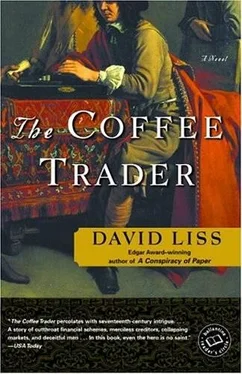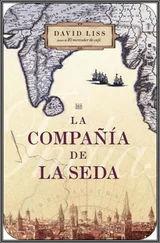“He is no one of consequence,” Miguel said rapidly.
She remained silent for a moment, to prove to him that she was calm. “I do not wish to pry. I know how my husband hates when I pry, but I wonder if I have anything to fear from him.” And then, because she found his silence frustrating: “Should we tell my husband?”
“No,” Miguel said. He stood and began to pace about the room. “You must not tell your husband or anyone else. Do not make more of this incident than is necessary.”
“I don’t understand you, senhor,” she said, studying the tiles on the floor.
“He is but a madman.” Miguel waved his arms about. “The city has an endless store of these wretches. You’ll never see him again, and so there is no need to alarm your husband.”
“I pray you are right.” Her voice sounded whiny and weak, and she hated herself for it.
Just then Annetje returned with a platter in her hands upon which she balanced two bowls of a dark liquid. Steam poured off from them like twin chimneys. The maid set down the tray and paused to glare at Miguel before departing.
Miguel laughed after she had left. “She thinks I’m poisoning you.”
What would the widow say? “There are two bowls, senhor. You are too wise a man to poison yourself as well.”
Miguel cocked his head slightly. “This is the new tea you smelled the other night. It is made of a medicinal fruit from the Orient.” He took his seat once more. “It will enhance your understanding.”
Hannah did not think she wanted her understanding enhanced. She felt she understood well enough. Unless the drink imparted knowledge and wisdom also, it would hardly do her any service. “You take it as well, but I don’t believe senhor needs his understanding enhanced.”
He laughed. “The drink has its own pleasures.” He handed her a bowl.
Hannah gripped it in both hands and smelled it. It was familiar, like something from a dream. Then she took a sip, and knowledge flowed into her. This was coffee-glorious, glorious coffee-here before her, like a gift from the heavens.
She understood so much now. It was a tea, not a food. She had been eating what she should have been drinking. In its liquid state it filled her with a glowing warmth, a comfort she had not known for years. “It’s wonderful,” she breathed. And it was. It filled an emptiness inside her, the way she had imagined love would when she’d been younger. “It’s wonderful,” she murmured again, and took another sip to hide the moisture in her eyes.
Miguel laughed again, but this time he seemed less superior. “The first time I tasted it, I almost spat it out from the bitterness. How strange that you should like it so. I hope you are not only saying so to be polite.”
She shook her head no and took another cautious sip, lest he see her gulp it. She wanted to drink the entire bowl at once and demand more, but she could not let him see how much she loved this thing that she should not know at all.
“I am not being polite,” she said.
They sat together in silence for some time, sipping and not quite looking at each other, until Hannah felt the urge to speak. It was as though something had broken inside of her, some kind of restraint. She wanted to stand up and walk around the room and speak. She did not stand, but she did at last decide to say something.
“I believe you are trying to distract me, senhor. Do you treat me to this new tea so I shall forget the strange man who spoke to me?”
She almost put a hand to her mouth. She ought never to have said such a thing. It was precisely the kind of sauciness her father would have answered with a slap. But it was said, and there was nothing to do but see what happened now.
Miguel looked at her and something flashed across his face, something Hannah found pleasing. “I did not mean to distract you. I only wished to-to share this with you.”
“You are generous,” she said, astonished by her own boldness before the words had even passed her lips. Could she not control herself now? Had some demon taken her body from her?
“You think me elusive,” he said, looking upon her as though she were some new discovery of natural science, “but I’ll tell you all. You see, that man is a terrible villain. He has a daughter whom he wishes to marry to a very old and mean merchant, a miser of the worst sort. He arranged that her true love should be abducted by pirates, but he learned of the incident and fled. The daughter has fled too, so the miser, knowing that I am friends with the lovers, came to try to force me to give him their location.”
Hannah laughed, loud enough that this time she felt obliged to place a hand over her mouth. “This tragedy of yours would play prettily upon the stage.”
For a moment she wished her father-or anyone else-was there to slap her. How could she have spoken so pertly? Nevertheless, it was true. Miguel’s lie sounded like the stage plays she had seen, with some regularity, back in Lisbon. Some men took their wives to the Jewish theater here in Amsterdam, but Daniel thought it improper for a woman.
Her foot rotated back and forth like a pigeon by a baker’s stall searching for crumbs. This coffee is not a drink of the mind, she realized, it is a drink of the body. And the mouth. And it made her want to say all sorts of things: I find you remarkably attractive. How I wish I could have married you instead of your cold brother.
She said none of them. She still could censor herself.
“You don’t believe me, senhora?”
“I believe you must imagine me to be remarkably foolish to accept your tale.” The words seemed to come out on their own. Her parents had always taught her to be mild. Her husband had indicated with a thousand unsaid words that he would tolerate only mildness from her. Yet she did not feel mild. She had never felt mild, but she had never before forgotten to act mild.
The coffee, she told herself. Miguel has, knowingly or not, bewitched me and perhaps himself. How long until they began to shout insults at each other or fell into an unrestrained embrace?
There was no point putting the blame on coffee. The drink had not bewitched her, no more than a glass of wine could cast a magic spell. It made her eager, in the same way wine rendered her calm. This sauciness, this pertness that grew inside her mouth came not from witchery but from herself. The coffee drink only let her bad behavior out.
In recognizing the truth, in admitting it to herself, much became clear to her, but nothing so much as a resolution: she would be pert and saucy every chance she had.
For the nonce, however, she had her most distressing encounter to contend with, and no amount of coffee or wine or any other tea she could think of would make the true terror she had felt any less real. She found Miguel’s efforts to deceive her both charming and infuriating. “I know that the world does not work the way it does in plays, and that misers do not send their daughters’ lovers into the hands of pirates.” She paused. “Nevertheless, you can depend on me to keep your secret.”
Miguel leaned back and looked at Hannah as though seeing her for the first time. He glanced at her face, her neck; his eyes lingered at the swell of her breasts concealed in her high-necked gown. Men often thought women had no idea of what their eyes studied, but a woman knew, as surely as though a glance left a handprint.
He had looked at her before, of course. She had sensed that he admired her face and her shape, but this glance was something different. Miguel and men like him rarely thought much of the women they admired and bedded. A woman was an object, sometimes to be consumed like food, other times to be admired like a painting. Miguel now saw her as something more, and the idea of it thrilled her.
Читать дальше












